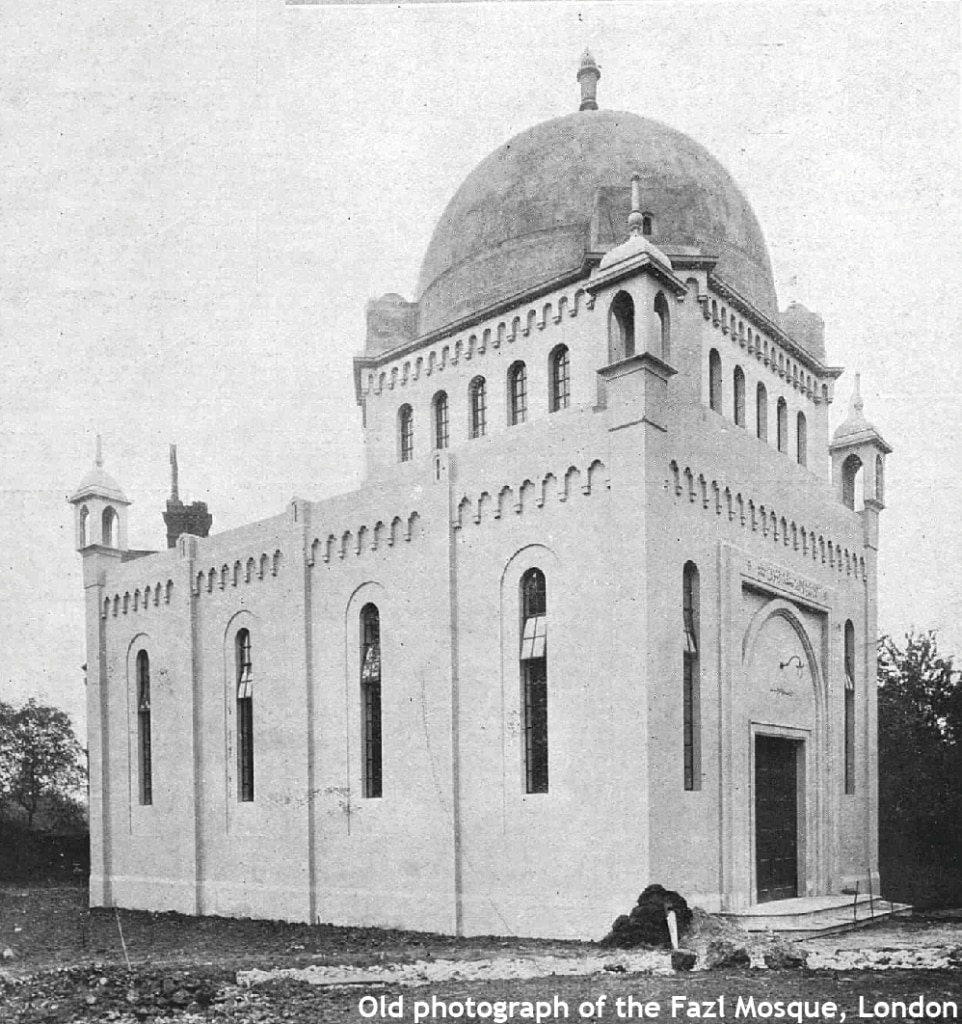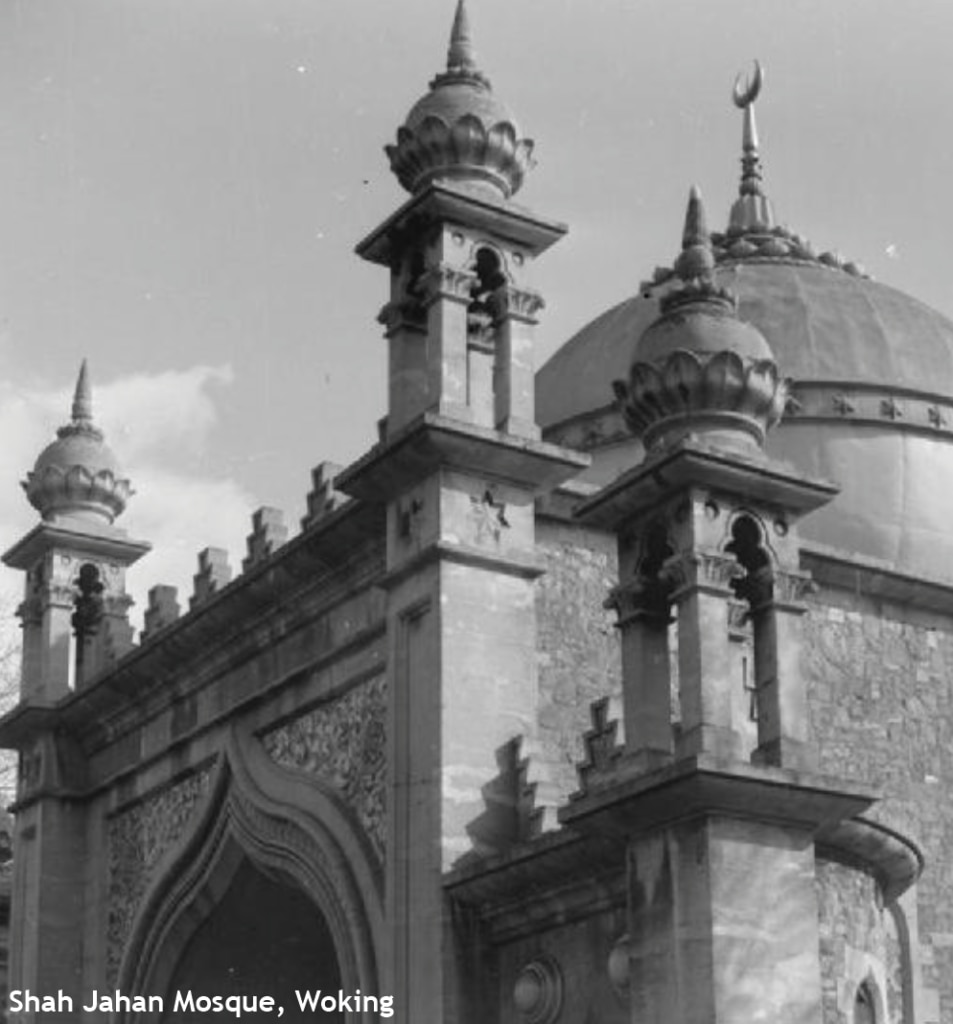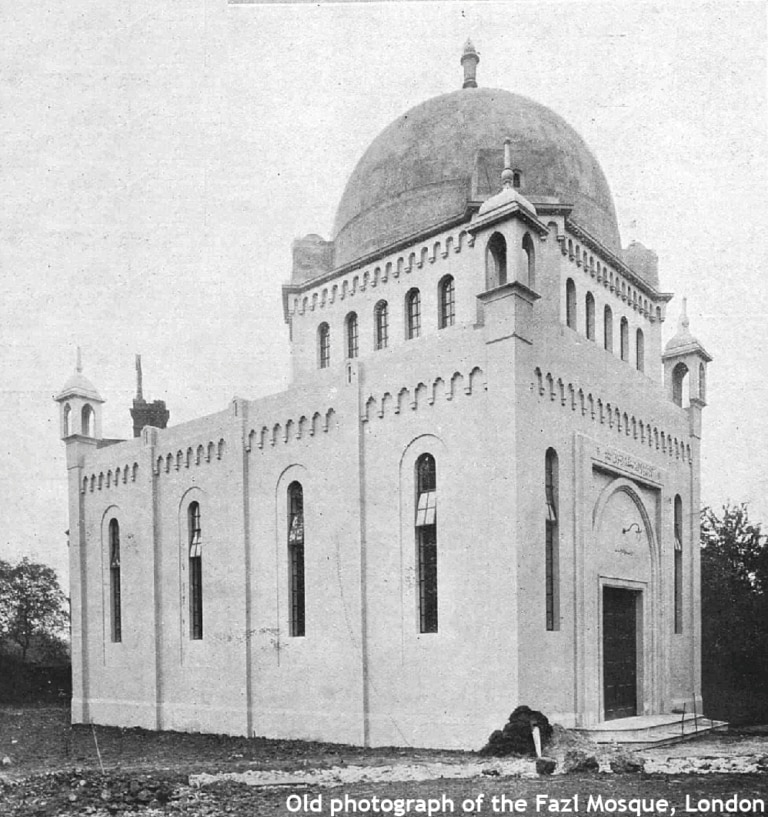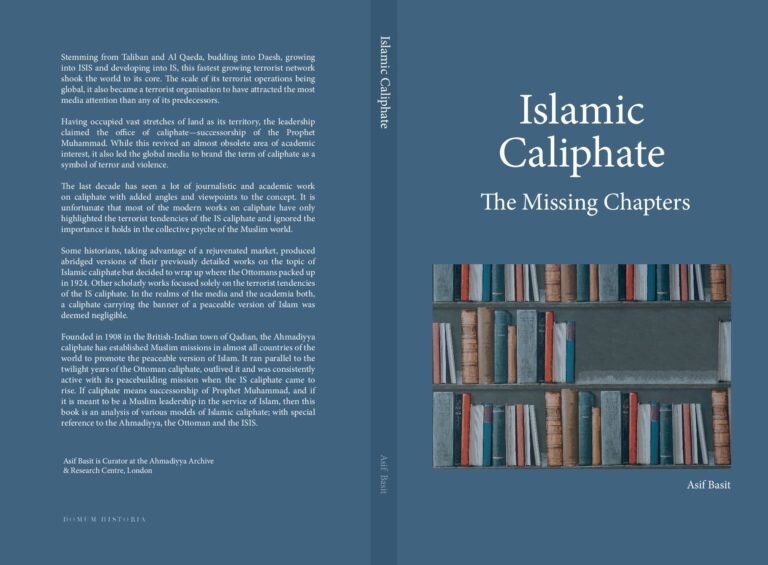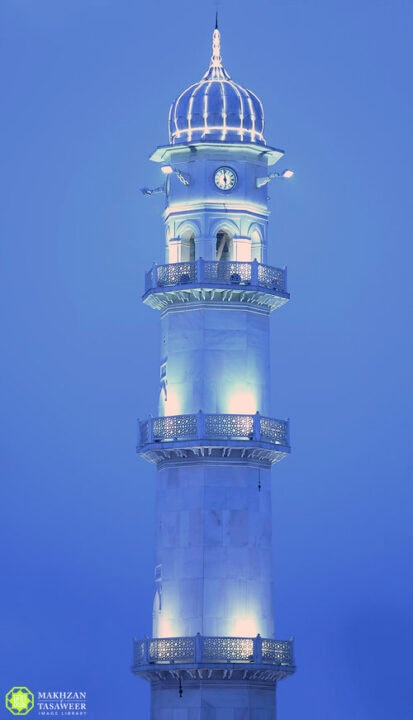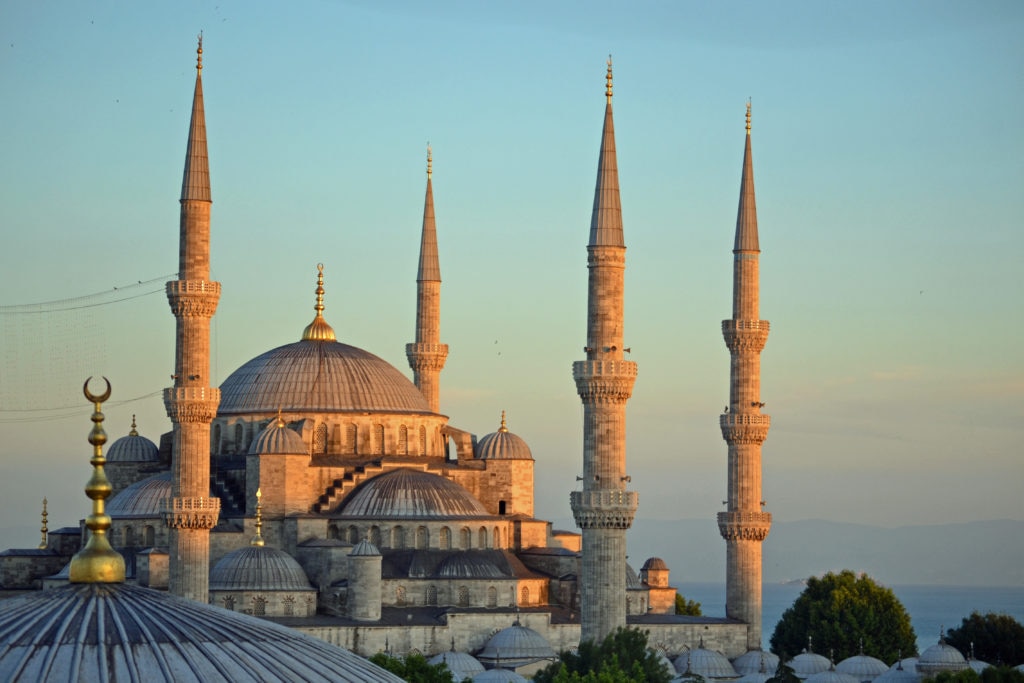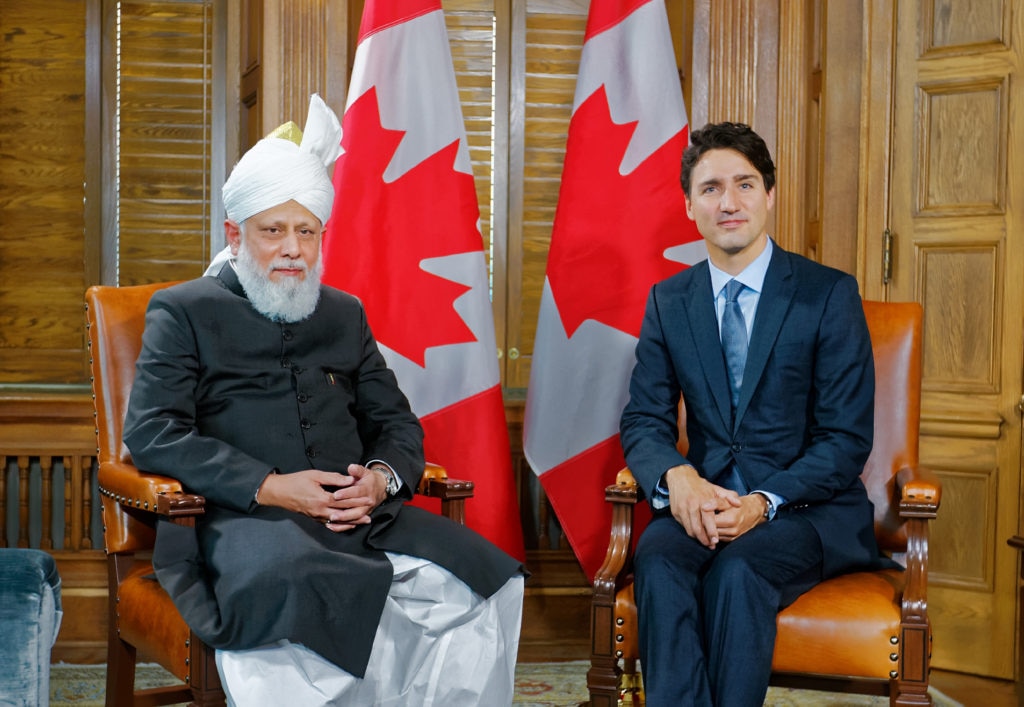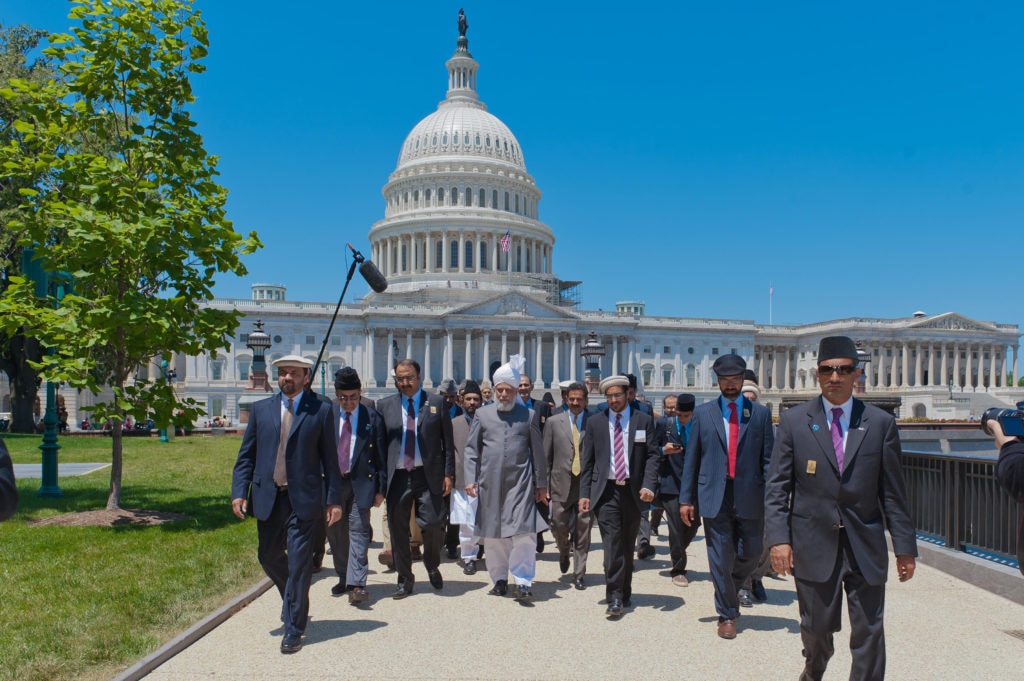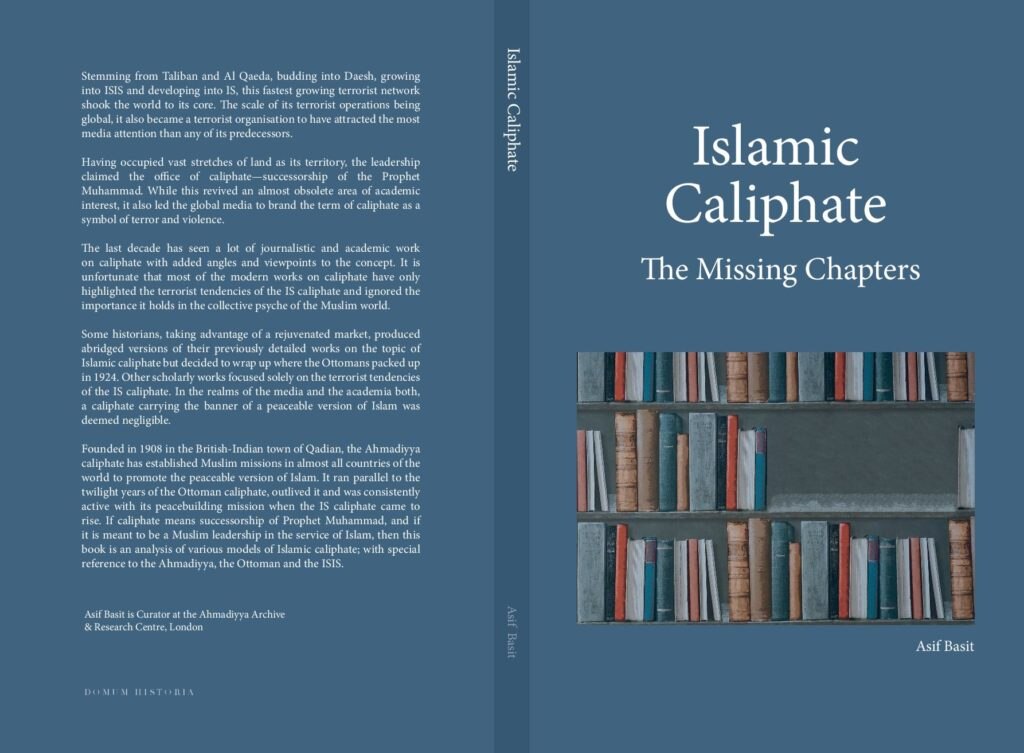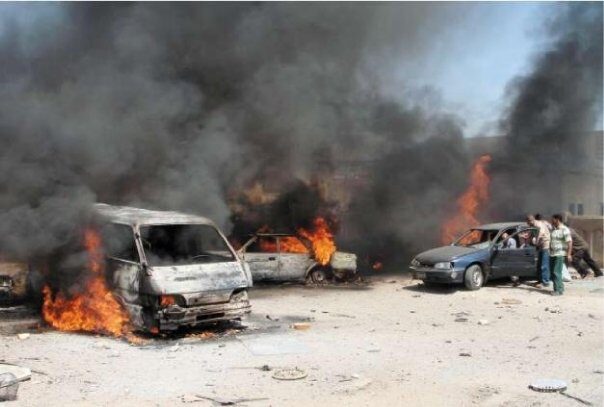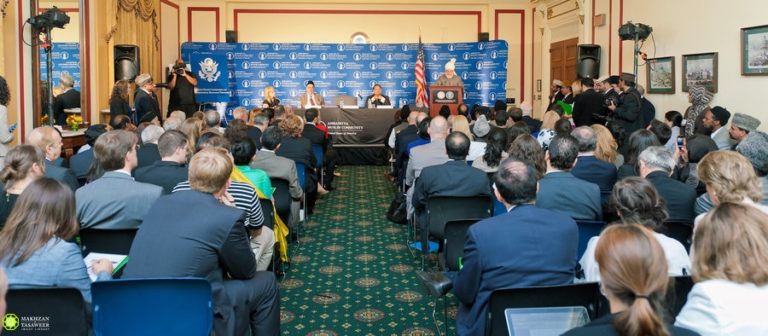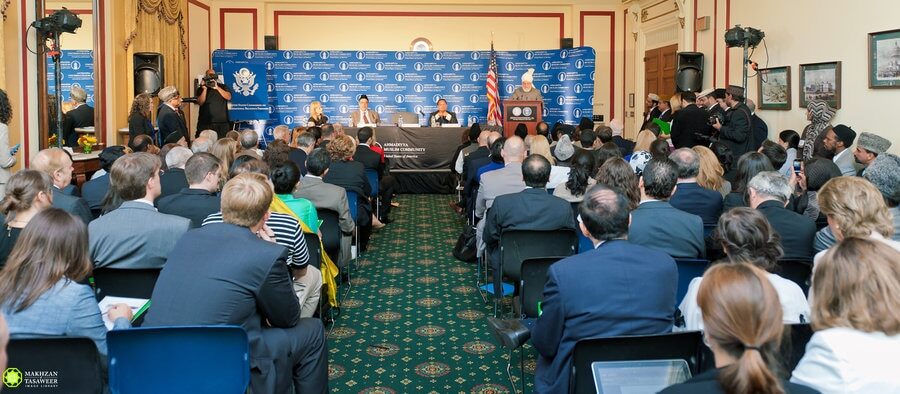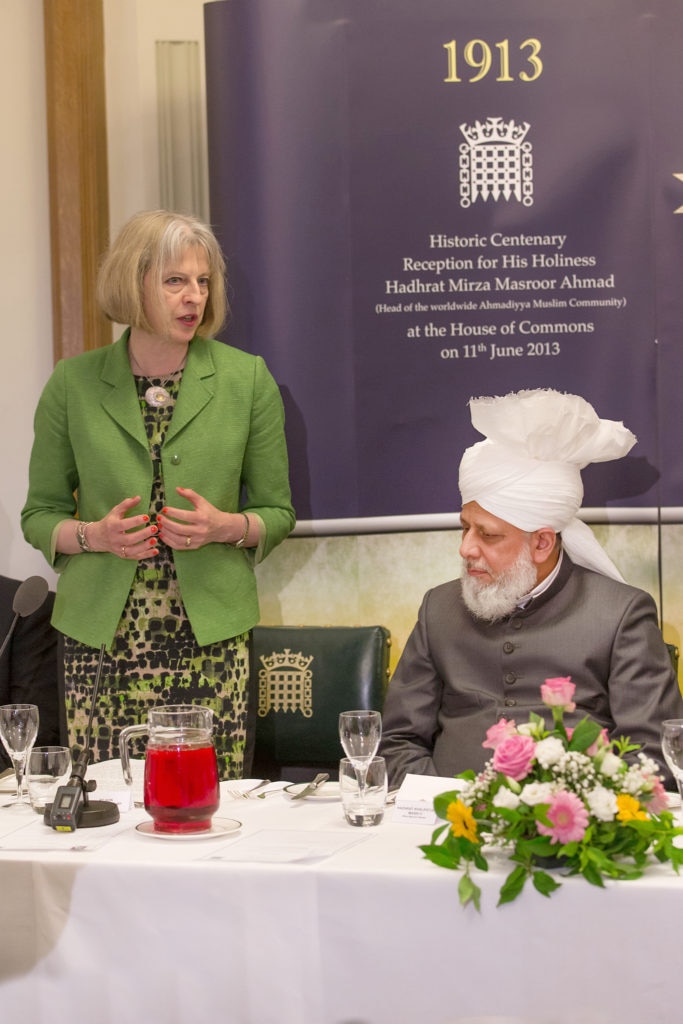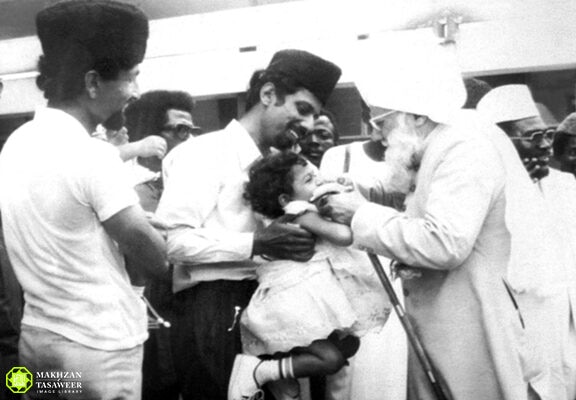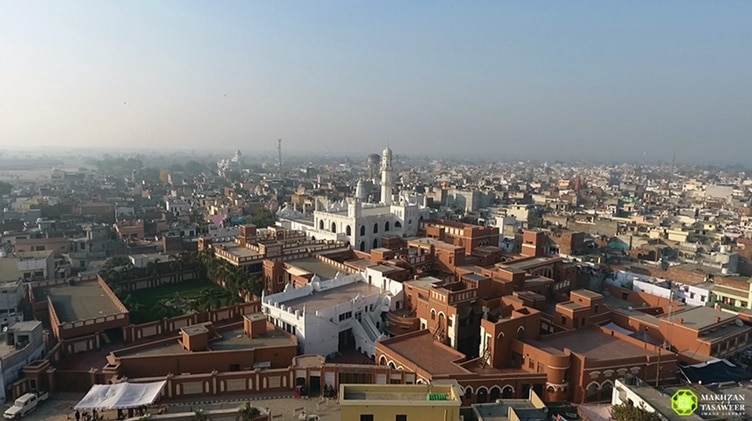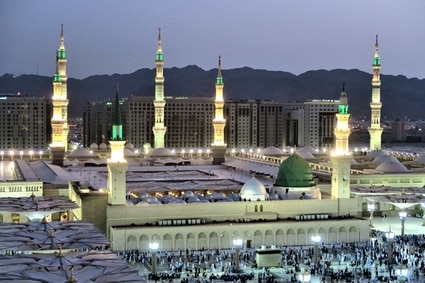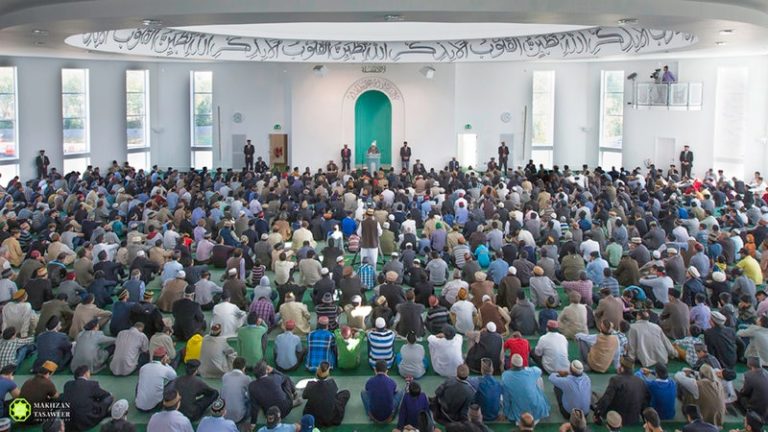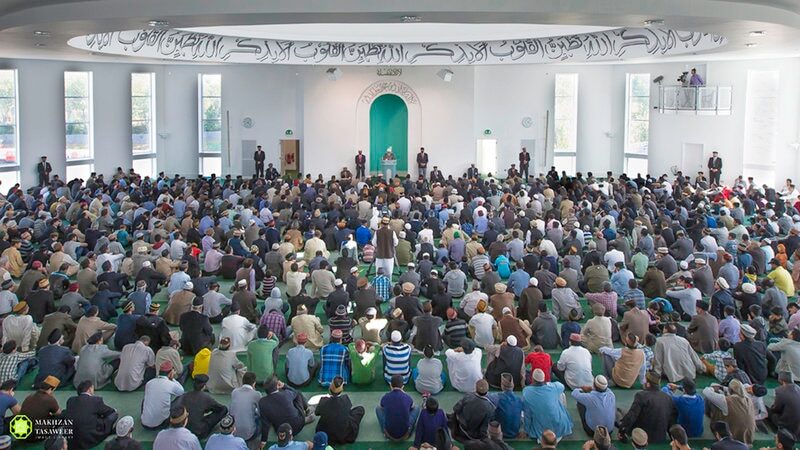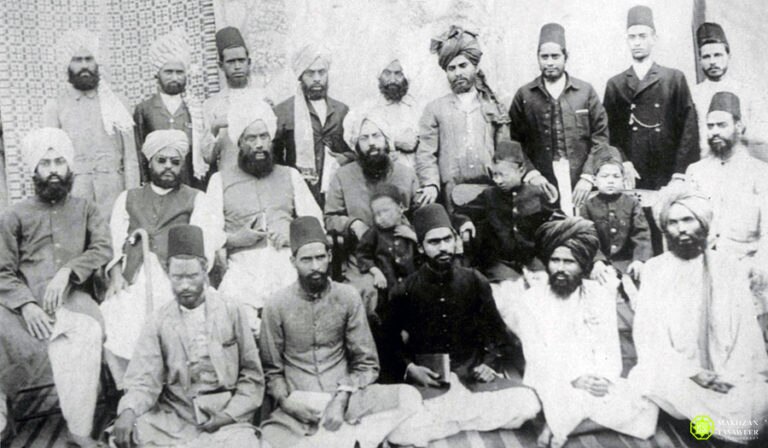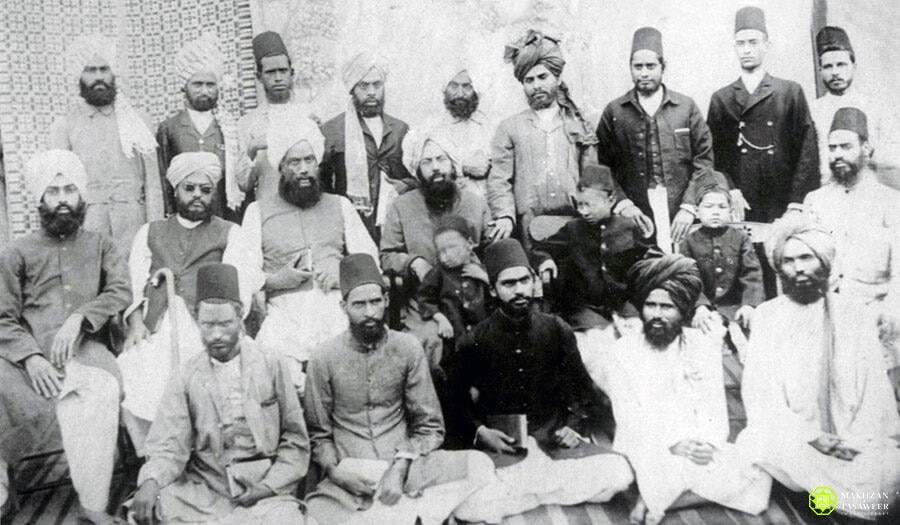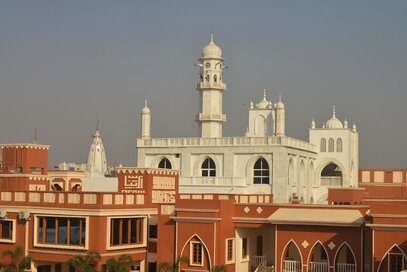Friday Sermon
26 April 2019
Delivered from Baitul Futuh Mosque
Men of Excellence
After reciting the Tashahud, Ta‘awuz, and Surah al-Fatihah, Hazrat Khalifatul Masih Vaa stated:
In the
previous sermon, while narrating the account of the life of Hazrat Usman bin
Mazoonra, I concluded by saying that he was the first person to be
buried in Jannatul Baqi. (Usdul Ghaba, Vol. 3, p. 591,
Usman bin Mazoonra, Dar-ul-Kutub al-Ilmiyyah, Beirut, 2003)
The
following details have been found regarding the inception and establishment of
Jannatul Baqi:
At the
time of the arrival of the Holy Prophetsa in Medina, there were many
graveyards. The Jews used to have their own graveyards, while the various Arab
tribes had their respective graveyards. The holy city of Medina was divided
into various neighbourhoods at the time, every tribe used to bury their dead in
an open field in their own area. Quba had its own graveyard, which was more
prominent. However, there were some other smaller graveyards as well. The tribe
of Banu Zafar had their own graveyard. Banu Salma had their own separate
graveyard. Among other graveyards, there was the graveyard of Banu Saaidah,
where Sooq an-Nabi was established later on. The location in which
Masjid-e-Nabawi [the Prophet’ssa Mosque] was built also had some
date trees, where there were a few graves of the idolaters. Baqi-ul-Gharqad was
the oldest and most famous amongst all these graveyards. The Holy Prophetsa
chose it as the graveyard of the Muslims, and since then it holds a unique and
prominent position, which remains till today and shall always do so.
Hazrat
Ubaidullahra bin Abi Rafey narrates that the Holy Prophetsa
was looking for a place, which would be designated for the graves of only the
Muslims. The Holy Prophetsa inspected various places and visited
them for this purpose. However, this honour was decreed for Baqi-ul-Gharqad.
The Holy Prophetsa declared, “I have been commanded to choose this
place i.e. Baqi-ul-Gharqad.” Baqi-ul-Gharqad used to be called
Baqi-ul-Kahbkhabah in those days.
It had
countless gharqad trees and wild bushes growing within. It had an
abundance of mosquitoes and other insects and when the mosquitoes rose, due to
the muddy land or the jungle, it seemed as if clouds of smoke had covered it
from above. The first person to be buried there, as has already been mentioned,
was Hazrat Usmanra bin Mazoon. Whilst placing a stone at the head of
the grave, the Holy Prophetsa said, “He has preceded us”. Thereafter,
whenever someone passed away, people would ask the Holy Prophetsa
where they should be buried. The Holy Prophetsa would answer, “Near
Usmanra bin Mazoon, who has preceded us”.
In
Arabic, baqi is a place in which there is an abundance of trees. This
place was known in Medina as Baqi-ul-Gharqad as there was an abundance of gharqad
trees. Apart from that it was rich in wild-growing bushes. It was also called
Jannatul Baqi. In Arabic, the word jannat carries the meaning of a
garden or paradise. For this reason, it was better known among the non-Arabs as
Jannatul Baqi.
Abdul
Hameed Qadri Sahib has given the aforementioned explanation. He then states
that one must not forget that the Arabs would call their burial grounds Jannat.
Another name given was Maqabirul Baqi, and this title of was more commonly used
by the Bedouins. (Justeju-e-Medina az Abdul Hameed Qadri Sahib,
p. 598, Oriental Publications, Lahore, Pakistan, 2007)
Hazrat
Salimra bin Abdullah narrates from his father that whenever someone
passed away, the Holy Prophetsa would say, “Send him forth to those
who have passed on from us. What an excellent pioneer Usmanra bin
Mazoon was from among my Ummah!” (Al-Mu‘jam Al-Kabir Li At-Tabarani,
Vol. 12, p. 228, Hadith 13160, Dar Ihyaa Al-Turath Al-Arabi, Beirut, 2002)
Hazrat
Ibn Abbasra relates that when Hazrat Usmanra bin Mazoon
passed away, the Holy Prophetsa approached his body, lowered his
head three times, then raised his head and loudly proclaimed, “O Abu Saib! May
Allah forgive you! You passed away from this world without being affected by
its impurities.”
Hazrat
Aishara narrates that when the Holy Prophetas kissed the
body of Hazrat Usmanra bin Mazoon, he was extremely emotional and
tears were flowing from his eyes. The Holy Prophetsa was in a very
emotional state at the time and both of his eyes were shedding tears. Hazrat
Aishara relates that the Holy Prophetsa kissed Hazrat
Usmanra bin Mazoon after he passed away. She states that she saw the
tears of the Holy Prophetsa falling on the cheeks of Hazrat Usmanra
bin Mazoon. The Holy Prophetsa shed so many tears that they were
falling on the cheeks of Hazrat Usmanra. When the son of the Holy
Prophetsa, Ibrahim, passed away, the Holy Prophetsa said:
اَلْحِقْ بِالسَّلَفِ
الصَّالِحِ عُثْمَانَ ابْنَ مَظْعُوْن
That is,
“May you be in the company of our righteous and dear friend, Usman bin Mazoon.”
(Usdul Ghaba, Vol. 3, p. 591, Usmanra bin
Mazoon, Dar-ul-Kutub al-Ilmiyyah, Beirut, 2003) (Al-Tabaqaat-ul-Kubra li ibn
Saad, Vol. 3, p. 303, Dar-ul-Kutub al-Ilmiyyah, Beirut, 1990)
Hazrat
Usmanra bin Affan narrates that when the Holy Prophetsa
led the funeral prayer of Hazrat Usmanra bin Mazoon, he recited the takbeerat
four times [i.e. reciting Allahu Akbar]. (Sunan Ibn Majah, Kitabul
Jana’iz Arba’an, Hadith 1502)
Some
people are of the opinion that more than three takbeerat cannot be said,
however it is possible to recite it aloud four times as well. Muttalib
narrates, “When Hazrat Usmanra bin Mazoon passed away, his funeral
was taken outside for burial. Upon this, the Holy Prophetsa ordered
an individual to bring a rock. He was unable to lift the rock as it was rather heavy.
Hence, the Holy Prophetsa went himself and stood beside the stone
and rolled up both of his sleeves.” Muttalib, who is narrating this incident of
the Holy Prophetsa, states, “It seems as if I am still able to see
the white complexion on the skin of both the Holy Prophet’s arms, i.e. I am
still able to recall the incident.” He further states, “The arms of the Holy
Prophetsa were beautiful and I am still able to see the white
complexion of his skin after the Holy Prophetsa had rolled up his
sleeves. Following this, the Holy Prophetsa lifted that rock and
placed it beside the head of the grave of Hazrat Usmanra bin Mazoon
and then said, ‘I will recognise the grave of my brother through this rock and
whoever passes away from among my family, I will bury them near it.’” This is a
narration from Sunan Abi Dawood. (Sunan Abi Daud, Kitabul Jana’iz, Bab
fi Jam’il Mautaa fi Qabr Wal Qabr Yu’lam, Hadith 3206)
I will
now mention some aspects in relation to Hazrat Usmanra bin Mazoon’s
demise as related by Hazrat Mirza Bashir Ahmadra. Mentioning
incidents of the second year after Hijra, Hazrat Mirza Bashir Ahmadra
states:
“To the
end of this year, the Holy Prophetsa proposed the creation of a
graveyard in Medina for his Companions which was referred to as
Jannatul-Baqi’. After its creation, the
Companions were generally buried in this very graveyard. The first Companion to be buried in this
graveyard was Usmanra bin Mazoon.
Usmanra was from among the most pioneer Muslims and was
extremely righteous and pious. He was a man of ascetic disposition. On one
occasion, after becoming a Muslim, he submitted to the Holy Prophetsa,
‘If the Holy Prophetsa kindly grants permission, it is my desire to
abandon the world completely and separate myself from my wife and children, so
that I may devote my life wholly to the worship of Allah.’ However, the Holy
Prophetsa did not permit him to do so.”
I have
already mentioned the details of this in my previous sermon. Nevertheless,
Hazrat Mirza Bashir Ahmadra further writes, “… the Holy Prophetsa
was deeply saddened upon the demise of Usmanra bin Mazoon. There is a narration that after his demise,
the Holy Prophetsa kissed his forehead and at the time there were
tears in the eyes of the Holy Prophetsa. After his burial, the Holy
Prophetsa fixed a stone at the head of his grave to serve as a
marking, and then, every so often, he would visit the Jannatul Baqi and pray
for him. Usmanra was the first Muhajir [migrant from Mecca to
Medina] to pass away in Medina.” (Sirat Khatamun-Nabiyyin, Hazrat
Mirza Bashir Ahmadra, pp. 462-463)
The wife
of Hazrat Usmanra bin Mazoon wrote the following elegy at his
demise:
یَا عَیْنُ
جُوْدِیْ بِدَمْعٍ غَیْرِ مَمْنُوْنِ
عَلٰی رَزِیّۃِ عُثْمَانَ
بْنِ مَظْعُوْنِ
عَلَی
امْرِیءٍ بَاتَ فِیْ رِضْوَانِ خَالِقِہٖ
طُوْبٰی لَہُ مِنْ فَقِیْدِ
الشّخْصِ مَدْفُوْنِ
طَابَ الْبَقِیْعُ لَہٗ
سُکْنٰی وَ غَرْقَدُہٗ
وَأَشْرَقَتْ اَرْضُہٗ
مِنْ بَعْدِ نَعْیَیْنِ
وَأَوْرَثَ الْقَلْبَ
حُزْنًا لَا انْقِطَاعَ لَہٗ
حَتّی الْمَمَات فَمَا
تَرْقٰی لَہٗ شُوْنِیْ
(Usdul
Ghaba, Vol. 3, p. 591, Usmanra bin
Mazoon, Dar-ul-Kutub al-Ilmiyyah, Beirut, 2003)
The
translation is as follows:
“O eye!
Shed endless tears on the demise of Usman, who spent his nights in accordance
with the pleasure of his Creator. Glad tidings be given to this unique and
exceptional individual who has now been buried. Baqi and Ghardaq has been
purified by this inhabitant and its surroundings have become illuminated
following his burial. Your demise saddened the heart to such an extent that it
will not heal until I die and this state of mine will not change.” (Usdul
Ghaba, Vol. 3, p. 495, Dar-ul-Fikr, Beirut)
These were
the sentiments expressed by his wife.
Hazrat
Umme Alaara, who was amongst the ladies from the Ansar and had
pledged allegiance to the Holy Prophetsa, narrated, “When the Ansar
were drawing lots from among the names of the Muhajireen to select their places
of residence, we received the name of Hazrat Usmanra bin Mazoon.”
Meaning
that they were to arrange accommodation for him in their house. She further
narrates, “Hazrat Usmanra bin Mazoon stayed with us. We also looked
after him when he was unwell and when he passed away, we buried him in his
clothes. The Holy Prophetsa came to meet us, and I said, ‘May Allah
have mercy on you O Abu Saib.’”
Abu Saib
was the title of Hazrat Usmanra bin Mazoon. She repeated these words
in the presence of the Holy Prophetsa and further stated, “I bear
witness that Allah has certainly honoured you.” She also repeated this in front
of the Holy Prophetsa. When the Holy Prophetsa heard
this, he enquired, “How have you come to know that God Almighty has most
certainly exalted him?” She responded, “O Messengersa of Allah! May
by parents be sacrificed for your sake, I am not certain about this, but this
is how I felt. Hence, I was expressing my feelings.” Upon this, the Holy
Prophetsa responded, “As far as Usmanra is concerned, he
has passed away and I hope for his prosperity (and that may God Almighty honour
him). However, by God, even I do not know what will happen to Usman.”
Even
though he had offered prayers for Hazrat Usmanra, he said, “I am a
prophet of God but even I am not certain of what will happen to Hazrat Usmanra.”
When Hazrat Umme Alaara heard this, she stated, “By God! I will not
consider anyone pious in this manner again.”
Meaning
that she would not say again that God had certainly pardoned someone. She
further stated, “This made me sorrowful and I fell asleep in this state.” She
was very close to Hazrat Usman, and the emotions were strong. In any case, she
states, “At night I saw in a dream that there is a flowing fountain which
belongs to Hazrat Usmanra.” She states: “After seeing this dream, I
visited the Holy Prophetsa and narrated my dream to him. The Holy
Prophetsa responded, ‘Such were his actions.’” (Sahih Bukhari,
Kitab Al-Shahadaat, Bab Al-Qur’ah fil Mushkilaat, Hadith 2687)
Meaning
that God Almighty showed the flowing spring to inform her that he was in
paradise and the fountain was a manifestation of his actions.
Hence,
this was the Holy Prophet’ssa way to train others that one should
not claim with such confidence and belief that God Almighty has forgiven
someone. However, when Hazrat Usmanra bin Mazoon’s pious deeds were
manifested to Hazrat Umme Alaara in a dream, the Holy Prophetsa
testified to this. The Holy Prophetsa was already aware that God
Almighty was pleased with his Companionsra who had participated in
the Battle of Badr. Also, the prayers of the Holy Prophetsa for
Hazrat Usmanra bin Mazoon in which he expressed his emotions
elaborate on the fact that he was sure that God Almighty would accept these
prayers and Hazrat Usman bin Mazoonra will be enumerated amongst
those who attain nearness to Allah Almighty, but regardless of this, he advised
her not to make such claims.
This
account has also been mentioned in Musnad Ahmad bin Hanbal in the
following manner:
Kharijah
bin Zaid mentions a narration from his mother that when Hazrat Usmanra
bin Mazoon passed away, Kharijah bin Zaid’s mother said, “Abu Saib, you are
virtuous man. Your good days were very exceptional indeed.” The Holy Prophetsa
heard this and enquired, “Who said this?” She responded: “It is I who said
this”. The Messengersa of Allah stated, “What led you to this
conclusion?” She replied, “O Messengersa of Allah! It was Hazrat
Usman bin Mazoon’sra deeds and acts of worship which led me to
believe that God Almighty has certainly treated him with forgiveness and
forbearance.” The Holy Prophetsa stated, “We did not see anything
but goodness in Usman bin Mazoon.” However, he also stated, “Bear in mind that
I am a Prophet of God, but by God, even then I am not certain as to what will
happen to me in the hereafter.” (Musnad Ahmad bin Hanbal, Vol. 8,
p. 872, Hadith Ummul Ulaa al-Ansar, Hadith 28006, Alamul Kutub, Beirut, 1998)
No one
was more beloved to God Almighty than the Holy Prophetsa, but his
level of fear of God and the realisation of His grandeur and greatness was such
that the Holy Prophetsa said even he was unaware of what his
condition would be in the hereafter. Therefore, if this was the state of the
Holy Prophetsa, then how much should we fear? In fact, we should be
greatly concerned about performing good deeds and directing our attention
towards the worship of God, and even then we should never take pride in this,
instead we should progress in humility and we should always beg God Almighty
for His grace and mercy, so that He may grant us His forgiveness.
In
another narration of Musnad Ahmad bin Hanbal, Umme Ala states, “Usman
bin Mazoon became ill whilst residing with us. We looked after him till he
passed away and we buried him in the clothes he was wearing. The Messengersa
of Allah visited us. I stated, ‘O Abu Saib, may Allah have mercy on you. I bear
witness that Allah has greatly honoured you.’ The Messengersa of
Allah stated, ‘How do you know that God Almighty has honoured him?’ I said, ‘I
am not sure, O Messengersa of Allah! May my parents be sacrificed
for your sake!’ The Holy Prophetsa then said, ‘As far as Usmanra
bin Mazoon is concerned, he has passed away and I hope for his prosperity that
Allah Almighty will grant him good. However, by God, even though I am the
Messenger of Allah but even I do not know about my own state in the
hereafter.’” Umme Ala further states, “I replied, ‘I will not proclaim anyone
to be holy after this.’” After this, she continued to describe as was narrated
in the aforementioned account regarding her state of anxiousness and also her
dream which she related to the Holy Prophetsa. (Musnad Ahmad
bin Hanbal, Vol. 8, pp. 871-872, Hadith Ummul Ulaa al-Ansar, Hadith 28004,
Alamul Kutub, Beirut, 1998)
This
account has been recorded in two different books of Ahadith.
God
Almighty has indeed granted the companions a lofty station. Further they were
recipients of the prayers of the Holy Prophetsa. May God continue to
elevate their status and may we emulate their example as well.
The next
companion whom I shall mention is Hazrat Wahab bin Saad bin Abi Sarahra.
His father’s name was Saad and he belonged to the Banu Aamir bin Lowi tribe.
Hazrat Wahabra was the brother of Abdullah bin Wahab bin Sarah. His
mother’s name was Mahana bint Jabir and she belonged to the Ashari tribe. (Al-Tabaqaat-ul-Kubra
li ibn Saad, Vol. 3, p. 217, Wahab bin Saad, Dar
Ihyaa al-Turath al-Arabi, Beirut, 1996)
Abdullah bin Saad bin Abi Sarah, the brother of Hazrat Wahabra, was the same katib-e-wahi [scribe who would write down revelations] who became an apostate. Regarding Hazrat Wahab’s brother, Hazrat Musleh-e-Maudra has written the following details:
“From
among the scribes of the Holy Prophetsa, one of them was named
Abdullah bin Abi Sarah.”
In Siratul
Halabiyyah it is written that he was the foster brother of Hazrat Usmanra
bin Affan. Nonetheless, Hazrat Musleh-e-Maudra further says:
“When
the Holy Prophetsa would receive a revelation, he would call for him
and ask for it to be written down. One day, the Holy Prophetsa was
dictating verses 14 and 15 of Surah Al-Muminun. When he reached the verse:
ثُمّ اَنْشَاْنٰہُ خَلْقًا
اٰخَرَ
Abdullah,
(the scribe being referred to) spontaneously said:
فَتَبَارَکَ اللّٰہُ اَحْسَنُ الْخَالِقِیْنَ
This is
mentioned in Surah al-Mominoon, verse 15. The Holy Prophetsa said
that this is exactly the verse that was revealed and asked him to write it
down. This wretched individual did not realise that in fact the verse he
recited was in fact a natural sequence in relation to the previous verses.
From
this, he inferred that just as the Holy Prophetsa had considered his
uttered words as divine revelation, the Holy Prophetsa himself was
[God forbid] fabricating the entire text of the Quran. He thus became an
apostate and left for Mecca. Abdullah bin Abi bin Sarh was among those
individuals for whom the Holy Prophetsa had stipulated the capital
punishment. Abdullah bin Abi bin Sarah was one of them. Hazrat Usmanra
however, gave him refuge. Details of the nature of this refuge are as follows:
At the
occasion of the conquest of Mecca, when Abdullah bin Abi Sarah came to know
that his execution had been ordered, he went to his foster brother, Usman bin
Affanra seeking refuge and said, ‘O brother, grant me refuge from
the Holy Prophetsa, before he has me killed.’” This is recorded in Siratul
Halabiyyah.
Hazrat
Musleh-e-Maudra further writes,
“He
remained in hiding at Hazrat Usman’sra residence for three or four
days. One day as the Holy Prophetsa was taking the oath of
allegiance from some Meccans, Hazrat Usmanra brought Abdullah bin
Abi Sarah in the presence of the Holy Prophetsa and requested him to
accept his pledge of allegiance. For a moment, the Holy Prophetsa
remained quiet, after which he accepted his pledge of allegiance. Like this,
Abdullah bin Abi Sarah once again accepted Islam.” (Tafsir-e-Kabir, Vol.
6, p. 139) (Al-Sirat al-Halabiyyah, Vol. 3, p. 130, Bab Dhikr
Maghaziyah/Fath Makkah, Dar-ul-Kutub al-Ilmiyyah, Beirut, 2002)
There
were many other reasons why the initial instruction to execute him had
been given. He had fanned the flames of discord and disorder. The commandment
of execution was not given because he had become an apostate but in fact there
were many other crimes of his.
Asim bin
Umar relates that when Hazrat Wahabra migrated from Mecca to Medina,
he stayed at the house of Hazrat Kulthum bin Hidamra. The Holy
Prophetsa had established a bond of brotherhood between Hazrat Wahabra
and Hazrat Suwaid bin Amrra. These two, i.e. the recently
established brothers, were both martyred in the Battle of Mautah. Hazrat Wahabra
participated in the battles of Badr, Uhud, Khandaq, Treaty of Hudaibiyyah and
Khaibar and he passed away in Jumada al-Ula 8 AH in the Battle of Mautah. He
was 40 years of age on the day of his demise. (Al-Tabaqaat-ul-Kubra
li ibn Saad, Vol. 3, p. 217, Wahab bin Saad, Dar
Ihyaa al-Turath al-Arabi, Beirut, 1996)
What was
the Battle of Mautah and what were the causes behind it? This has been
mentioned in Tabaqaat al-Kubra.
This
battle took place in Jumada al-Ula in 8AH. The Holy Prophetsa
sent Harith bin Umair with a letter as a messenger to the King of Busrah. When
they reached the place called Mautah, they met with Shurahbeel bin Amr
Ghassaani, who was one of the governors of Syria appointed by the roman
emperor, this is according to Sirat-ul-Halabiyyah. He stopped them and martyred
them. Other than Harith bin Umair, no other messenger of the Holy Prophetsa
was martyred. When news of this tragedy reached the Holy Prophetsa,
it bore heavily on his heart and he was aggrieved on account of his demise. The
Holy Prophetsa called upon the people to gather for battle. The
people gathered, and the total number of the army was 3,000. The Holy Prophetsa
declared that the leader of this group would be Hazrat Zaidra bin
Haritha, and after preparing a white flag and handing it to Zaidra,
the Prophet advised, “Go to the place where Hazrat Harithra bin
Umair has been martyred and invite the people there to Islam. If they accept
it, then fine, but if they do not, then seek Allah’s help against them and
engage with them in battle.” (Al-Tabaqaat-ul-Kubra li ibn Saad,
Vol. 2, p. 314, Siryah Mautah, Dar Ihyaa al-Turath al-Arabi, Beirut, 1996) (Al-Sirat
al-Halabiyyah, Vol. 3, p. 96, Bab Dhikr Maghaziyah/Ghazwah Mautah, Dar-ul-Kutub
al-Ilmiyyah, Beirut, 2002)
Hazrat
Wahabra was also a part of this battle. (I will further elaborate
the details of this battle.) Hazrat Abdullahra bin Umar states that
the Holy Prophetsa appointed Hazrat Zaidra bin Harith a
during the expedition of Mautah as their leader, and said “If Zaid is martyred,
then Jafar will be your leader, and if he is also martyred, then Abdullah bin
Rawahah shall take his place.” This group of men was also known as the Infantry
of Leaders. (Sahih Bukhari, Kitabul Maghazi, Bab Ghazwah Mautah Ard
al-Sham, Hadith 4261) (Musnad Ahmad bin Hanbal, Vol. 7, p. 505, Hadith
22918, Musnad Abu Qatadah Ansari, Alamul Kutub, Beirut, 1998)
Whilst
elaborating on this, Hazrat Musleh-e-Maudra has written that
according to one narration, a Jew who was sitting nearby, heard what the Holy
Prophetsa had just said and approached Hazrat Zaidra and
said to him, “If Muhammadsa is true then none of the three of you
shall return from the battle alive.” At this, Hazrat Zaidra replied,
“Regardless of whether I return from this battle alive or not, it as an
undeniable truth that the Prophet Muhammadsa is a true Messenger and
a truthful Prophet of God.” (Fareezah-e-Tabligh aur Ahmadi Khawatin, Anwarul
Ulum, Vol. 18, pp. 405-406)
The news
about the martyrs of this battle was conveyed through divine revelation to the
Holy Prophetsa. Regarding this there is a narration, in which Hazrat
Anasra bin Malik relates that the Holy Prophetsa stated,
“Zaid took up the holding of the flag and he was martyred, after which Jafar
took hold of the flag and he, too, was martyred, and after this, Abdullah bin
Rawahah took hold of the flag and he was also martyred.” While telling this to
the people, tears were flowing from the eyes of the Holy Prophetsa.
After this the Prophetsa went on to say, “Thereafter, from among the
ranks, Khalidra bin Waleed stepped up and took hold of the flag and
they were ultimately granted victory.” (Sahih Bukhari, Kitabul Janaiz,
Bab Al-Rajulu Jan’aa ilaa Ahlil Mayyit bi Nafsihi, Hadith 1246)
May God
Almighty continue to raise the spiritual status of these Companionsra
of the Holy Prophetsa. After having mentioned these companions, I
shall now mention some deceased ones whose funeral prayers I shall also be
leading today.
The
first funeral is of Respected Malik Muhamad Akram Sahib, who was a missionary
of the community. He passed away yesterday, 25 April, in Manchester; to Allah
we belong and to Him shall we return. His funeral is present here and after the
prayers, Insha-Allah, I will lead his funeral prayer outside [the
mosque].
He was
born on 2 April 1947, in Malkwaal in the district of Gujrat. In 1961 he
performed Bai‘at [pledge of allegiance] and entered the Jamaat. His elder
brother, Master Azam Sahib had accepted Ahmadiyyat prior to this and Akram
Sahib also performed the Bai‘at after him.
I
remember he wrote an article in which he wrote that he only came to Rabwah for
his studies but having been influenced by the atmosphere of Rawbah, he
performed the Bai‘at. Nonetheless, in 1962, after he had performed Bai‘at, he
dedicated his life for the Jamaat. After completing his BA, he received his
Shahid degree and also Maulvi Fazil degree. He was assigned as a missionary in
1971.
In 1970,
Hazrat Khalifatul Masih IIIrh led his nikah which was settled with
Amatul Karim Sahiba, daughter of Maulvi Abul Basharat Abdul Ghafoor Sahib.
Akram Sahib had the opportunity to serve as a missionary in different places in
Pakistan as well as countries outside of Pakistan. He served in various Jamaats
across the UK for approximately 30 years, including Oxford, Manchester, Glasgow
and Cardiff. His total service spans approximately 48 years. In the UK, he
served as Naib Afsar Jalsa Gah for many years.
From
1971 to 1973, he served in various places throughout Pakistan. From 1973 to
1977 he served in The Gambia. From 1977 to 1979 he served in Karachi, Pakistan
after which he served in Rabwah in Wakalat-e-Tabshir from 1979 to 1980. Between
1980 and 1983, he served as the principal of the Missionary College in Hilaro,
Nigeria, after which he returned to Pakistan and stayed in Rabwah until 1989.
From 1989 until 2018 he had the opportunity to serve in the UK. Initially in
2007 he reached the official age of retirement but was re-employed in February
2007 and had the opportunity to serve until 2018. Although a Waqf-e-Zindagi
always remains in his capacity as a life devotee, however recently due to
illness he was unable to actively carry out his duties and therefore he
retired. Nonetheless, we can say that he only spent a few months without being
in active service and in this way he served until his last breath.
Amir
Sahib UK [National President] writes, “He was very hard working, obedient and
had a pleasant nature. Whichever Jamaat work that was assigned to him, he would
complete it with great effort and diligence. It was his habit to immediately
compile a full report and send it. He was appointed to serve in Manchester.
Malik Sahib worked tirelessly to collect funds for the Darul Aman mosque when
it was being constructed.”
Ataul
Mujeeb Rashed Sahib writes, “Akram Sahib was a man of principle and possessed
many qualities. He was very pious, honest and an extremely loyal Ahmadi. He was
a passionate missionary who would work diligently. He was a servant of the
Community who displayed the highest levels of obedience for Khilafat.”
Majeed Sialkoti Sahib writes, “He possessed many qualities, the foremost that he was an extremely loyal servant of Khilafat. He had a passion for tabligh [propagating the message of Islam].” Sialkoti Sahib further writes, “When we
were students, during the holidays he once visited our village and said that
they ought to go out for tabligh, and became involved in tabligh activities. He
had sacrificed his holidays to perform tabligh with Khuddam and Ansar. He
always displayed obedience throughout his life.”
Aslam
Khalid Sahib, who is serving in the private secretary’s office in London,
writes, “He became a close relation of mine (they were both related through
marriage). Wherever he was appointed, he would win the hearts of the people
through his affection. He even served throughout his illness and he would
especially speak lovingly about the people of Manchester. He had a loving
relationship with the youth and children of the Jamaat.”
Giving
one example of this, Aslam Khalid Sahib says, “He once told me an incident
regarding one of the children who grew up with him and then later married; from
among them one of the youths was expecting their first child. When the child
was born, he called him at 2:30am or 3am informing him that his first child had
been born. Akram Sahib said that he thought to himself that this was not an
appropriate hour to inform him via telephone and he could have easily called in
the morning. However, it was the love the youth had for his missionary and who
had played a significant part in his upbringing. He said he was left speechless
by his next comment. The youth said, ‘Murabbi Sahib! I had vowed that whenever
God Almighty would grant me a child, you would be the first person I would
inform. Now that I have told you, I will inform my father.’”
This was
the love and affection people had for him and his love for the Jamaat members.
May God Almighty continue to elevate his status, shower His forgiveness on him
and grant his loved ones steadfastness and courage to bear this loss. His
funeral is present, as mentioned earlier, I will go outside to lead his funeral
prayer.
The
second funeral prayer is of Chaudhry Abdul Shakur Sahib who was a missionary of
the Community. He was the son of Chaudhry Abdul Aziz Sahib Sialkoti. He passed
away on 12 April; to Allah we belong and to Him shall we return.
He was
born on 10 November 1935 and was an Ahmadi from birth. His paternal grandfather
pledged allegiance in 1901. Respected Abdul Shakur Sahib completed his FA
[Intermediate] examinations, after which he completed his Shahid and Maulvi
Fazil and dedicated his life in 1956. Prior to this, he worked in the Railway
Division as a typist. In 1962 he passed his Maulvi Fazil examination and in
1963 he graduated from Jamia Ahmadiyya with a Shahid degree. In July 1963, he
was appointed in Wakalat-e-Mal Thani after which he had the opportunity to
serve in various offices in Rabwah. In 1964, he was sent to Sierra Leone for
the propagation of Islam and he served there until 1968. From December 1970 to
December 1973 he remained in Ghana. From 1975 to 1978 he served in the Gambia.
From February 1980 to April 1986 he served in Liberia. In these countries, the
deceased had the opportunity to serve as amir [national president] and
missionary in-charge. In 1990, he was appointed as Naib Wakil-ul-Tabshir. In
addition to this, he served as Naib Wakil-ul-Mal Thalith, Secretary Committee
Abadi and Naib Wakil-ul-Mal Thani. After retirement in 1995, he continued to
work until 2004. Owing to pain in his eyes due to glaucoma, he retired in 2004.
His son,
Dr Abdul Sabur Sahib, who resides in USA, says, “My father was a very hard
working and simple man. I saw him spreading the message of Islam and involved
in moral training in Liberia as Amir and missionary in-charge. He would always
prepare his sermons diligently using references from the Holy Quran, Ahadith,
books of the Community, the Bible etc. He would preach to the Christians and
other Muslims with arguments and would always speak politely.” He further
writes, “He spent on all our educational needs despite having limited resources
and ensured all of us siblings were given an excellent education.”
Mahmud
Tahir Sahib, Qaid Amoomi for Ansarullah, Pakistan, writes, “He would always
work quietly and without drawing attention to himself and was an influential
figure.”
Naib
Wakil-ul-Tabshir, Sheikh Harris Sahib, writes, “He had a balanced temperament
and had a noble character. He had a meticulous nature and was an extremely
loyal and devoted servant of Ahmadiyyat and Khilafat.”
Haider
Ali Zafar Sahib, who is currently serving as Naib Ameir of Germany, writes:
“Abdul Shakur Sahib possessed many qualities. He was very loyal, had a balanced
temperament and hard working. He would always be mindful when spending money of
the Jamaat. He was pious and a man of principal. Whilst in Liberia, he managed
the bookshop of the Jamaat in a most excellent manner. From the earnings of the
book shop, he built a new mosque and accommodation for the missionary. In a
small area he built a complex which included a library, a guest room and
separate space in the mosque for men and women to offer their prayers.
Alongside this there was a residence for the missionary. During the
construction he would join in with the workers. Initially, he generated the
revenue himself and had the complex built but he also joined in alongside the
workers in building the complex as well.”
Haider
Ali Sahib further says, “In 1986 when I took charge from him, we held a
farewell ceremony. During the ceremony it was mentioned that he worked very
hard in order to build the mosque and the mission house. In response to this he
said with great humility, ‘The missionary before me had the opportunity to
acquire the land and God Almighty granted me the opportunity to see the project
to completion. Now you are able to hold various tabligh activities. In short,
it is all down to the blessings provided by God Almighty.’”
The
deceased was a musi [part of the institution of Al-Wasiyyat]. Aside from
his wife, he is survived by two daughters and three sons. May God Almighty
elevate his status.
The third
funeral in absentia is of respected Muhammad Saleh Muhammad Sahib, who was a
Muallim of Waqf-e-Jadid. He passed away according to the will of Allah on 21
April 2019; to Allah we belong and to Him shall we return.
His
great grandfather was Malik Allah Bakhsh Sahib, who was a companion of the
Promised Messiahas. He witnessed the sign of the solar and lunar
eclipse and travelled by foot to Qadian from Lodhran and had the honour of
doing the Bai‘at at the hand of the Promised Messiahas. His father,
respected Ghulam Muhammad Sahib, was also a Muallim and in fact he was from
among the early Muallimeen.
Muhammad
Saleh Sahib was born in 1959 and in 1976 applied to enrol in Jamia Ahmadiyya,
however his application was unsuccessful as he was past the age set for
admission. He then worked in a mill in Kotry. His son writes that our
grandfather, Malik Ghulam Muhammad Sahib once went to Kotry to visit him and
did not like the atmosphere there. He immediately instructed him to leave the
job and to devote his life as a Muallim under the Waqf-e-Jadid scheme. Thus, he
left the job and returned. He was already married at the time and was earning
450 rupees from that employment which was a significant amount in those days,
however he left and came back and joined the Muallim class. When he qualified
as a Muallim, the allowance set by the Jamaat at the time was 135 rupees,
however he considered this as a great honour that God Almighty had granted him
the opportunity to serve the faith. Thus, initially he was working for worldly
gains but then devoted his life and was earning almost a quarter or a third of
what he was earning before.
In 1989
he was appointed to Nagarparkar and had to endure very difficult conditions
there. His son, who is a missionary, writes, “My mother told me that when they
were appointed to the village in Nagarparkar, the Muallim house had been left
shut for many years and the house had fallen through. And so, during the day
their father would travel quite a distance to bring sand and water and gather
it there and then in the night both husband and wife would prepare bricks from
it. Once the bricks had dried up, they both constructed their accommodation
themselves as there was no place to stay at the time.”
These
early Muallimeen in the area of Sindh rendered great sacrifices and endured
those conditions. Thus, they first travelled long distances to gather the water
and sand, thereafter they would mix it and prepare bricks from it and then they
themselves built a room from it for them to live in and did not make any
demands from the Jamaat. His son further writes,
“They
told me that in Nagarparkar they had no facilities as such since they lived in
a remote area. Therefore, when they would come for meetings, they would have to
purchase their rations for the entire month and also homeopathy medication and
other items. Once, he came to attend the meeting and got lost on his way back.
Since the area is dessert terrain, one has to follow the footprints on the
ground to determine the way. However, he could not correctly follow the
footprints and strayed from the path. It is extremely hot in that area and the
water he was carrying with him finished. Owing to extreme thirst and fatigue he
became unconscious and fell. He was lying on the floor, when two people riding
on camels approached and saw that it was Dr Sahib. Since he administered
homeopathy medication to the locals in Nagarparkar, therefore he was referred
to as Dr Sahib by the locals. The two individuals who saw him were also his
patients and so they gave him some water and took him back to their village. He
spent the night there and then the next day took him back to the centre in
Nagarparkar.”
His son
further writes:
“He
always reminded his children to offer their five daily prayers. He regularly
offered the Tahajjud prayer and even on the day he passed way, he offered the
Tahajjud prayer and also woke my mother to pray as well. He was extremely
courteous and showed great love to people. If anyone wronged him, he would bear
it with patience and would never respond. He was also very good at making
connections with people and was very well-known amongst people. He was very
trustworthy and people would trust him with their possessions and leave them
with him. If there was any discord amongst the members of the family, he would
always seek to reconcile.”
The
deceased was a musi and leaves behind his wife, three sons and three
daughters. One of his sons, Mubarak Ahmad Munir Sahib is currently serving as a
missionary in Burkina Faso and therefore could not go back to Pakistan upon the
demise of his father. May God Almighty elevate his station and grant him His
mercy and forgiveness. May He also enable his progeny to serve their faith with
the same passion and spirit of sacrifice.
The
fourth funeral prayer in absentia is of respected Mwishehe Jummah Sahib of
Tanzania. He passed away on 13 March; To Allah we belong and to Him shall we
return. He was born in 1933/34 in Morogoro Region of Tanzania. He joined the
Ahmadiyya Muslim Community in 1967. The account of his acceptance to Ahmadiyyat
is as follows:
There
was a tradition amongst the Sunni Ulema of the area that if a child passed
away, they would carry out the Khatam ceremony and also the Aqiqa. However, he
was opposed to such traditions such as the Khatam ceremony and also the Aqiqa
of a child who had passed away. Some of the Sunni Ulema were of the opinion
that the Aqiqa of a new-born, who had recently passed away, ought to be
performed as quickly as possible as opposed to performing the Aqiqa of a child
still alive, this was so that there could be more opportunities for them to
eat. However, Mwishehe Sahib had not come across such an Islamic teaching which
supported this practise of the Maulvis and therefore was greatly saddened and
appalled at the pitiable state of the Muslims.
He would
always pray to God Almighty to send down Jesusas, so that he would
once again revive Islam. The missionary in-charge writes that Mwishehe said
that when he met the missionary of the area, who at the time was
Jamil-ul-Rehman Rafiq Sahib and is currently serving as a Wakil-ul-Ishaat in
Pakistan, he informed him of the saying of the Holy Prophetsa in
which he said that one who dies without having recognised the Imam of the age,
dies a death of ignorance. This led him to reflect upon the fact that he had
not accepted the Imam of the Age and therefore was not a true Muslim and so
immediately accepted Ahmadiyyat. Thereafter, he went back to his village and
gathered everyone and conveyed the message of the Promised Messiahas,
including to his siblings, other family members and friends. In that same year,
his brother, Idi Salman Sahib, who has passed away now and also Jummah Sahib’s
wife, accepted Ahmadiyyat as a result of his tabligh efforts. The deceased had
to endure great hostility as well but gradually with time people began to enter
the fold of the Jamaat. Now, Ahmadiyyat is also well-established in the
neighbouring villages to his village of Mkuyuni.
The
missionary in-charge writes that the Mkuyuni Jamaat is one of the most
exemplary Jamaats in the Morogoro Region and this Jamaat was established
through his efforts. After accepting Ahmadiyyat and right till his demise, his
every action demonstrated his deep love for Khilafat. He also showed great
respect towards the missionaries and office-bearers of the Jamaat. He strictly
followed the Nizam-e-Jamaat. He had great passion for tabligh and would never
let any opportunity for tabligh go to waste. He was at the forefront of those
who paid their Chanda. In fact, he would always be thinking about giving Chanda
whenever he would receive any money. He would often say that this world is
temporary and has no value.
He was a
musi and would also urge others to join this blessed scheme. He was
exemplary in regard to prayers and would offer the five daily players and also
urged his children and grandchildren to offer their daily prayers.
He
offered the Tahajjud prayer with great passion. He had memorised many prayers
of the Holy Prophetsa and had great passion to read the books of the
Promised Messiahas. His son, Shamoon Jummah Sahib, who is a teacher
at Jamia Ahmadiyya Tanzania, writes, “From 1987 to 1990, all three of us
brothers studied in Jamia Ahmadiyya Tanzania (they teach the Mubasher course
there). I recall that once during the holidays we decided that one of us
brothers would leave Jamia studies and return home and help our parents in
their daily chores. When we mentioned this to our father, he was extremely
displeased with this.” Shamoon Jummah Sahib writes, “I can never forget that
day. My father became very passionate and he told us that we should place our
trust in God Almighty and continue with the Jamia studies and to not
leave.”
Thus, he
instilled a spirit of serving the Jamaat in all three of his children.
May God
Almighty grant him His mercy and forgiveness and elevate his status. May He enable
his progeny to also become true servants of Islam. As I mentioned that after
the prayers, I shall lead their funeral prayers. The funeral of Malik Akram
Sahib is present here and so I will go out of the mosque to lead the funeral
prayer and members should remain in the mosque and join the prayer from here.
(Translated by The Review of Religions.
Original Urdu published in Al Fazl International, 17 May 2019,
pp. 5-9)
